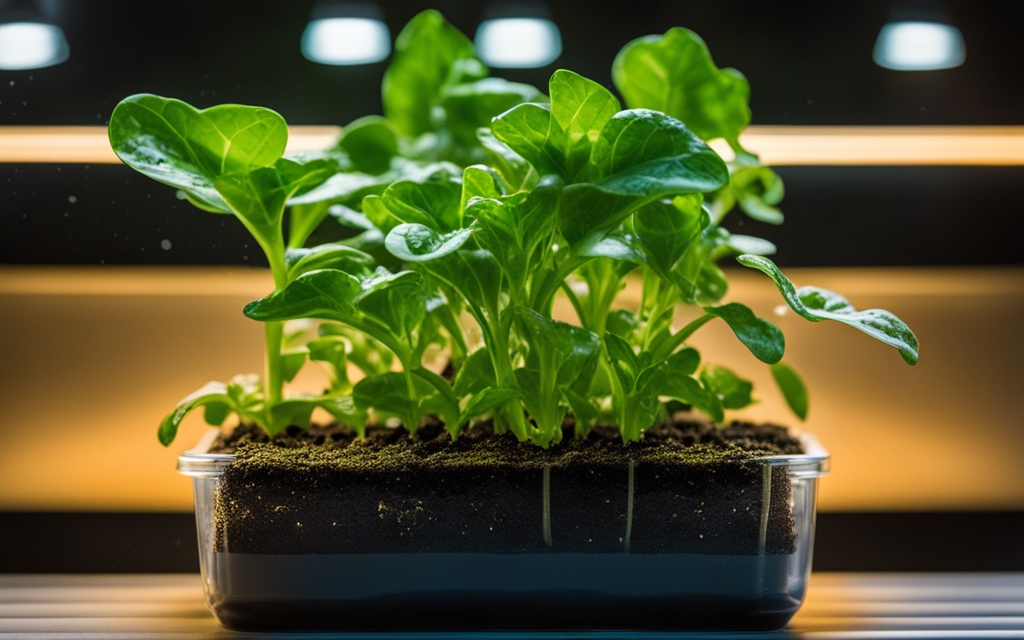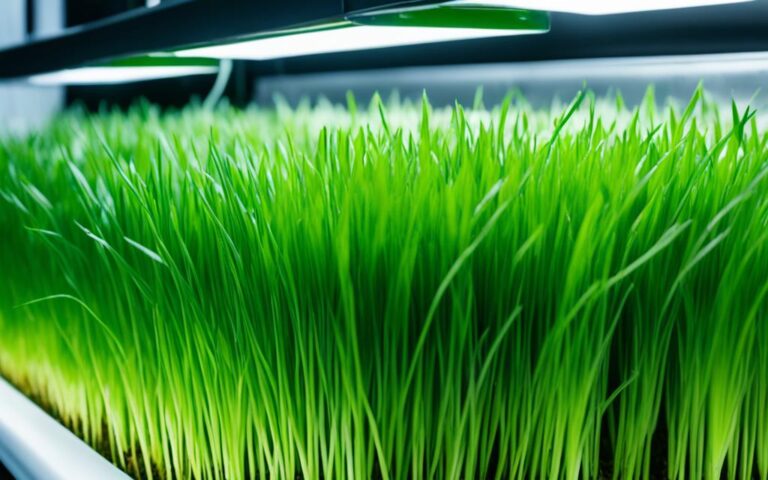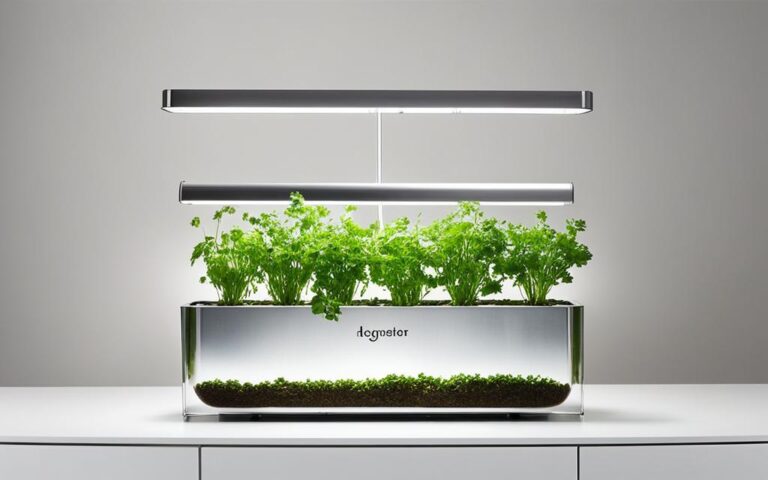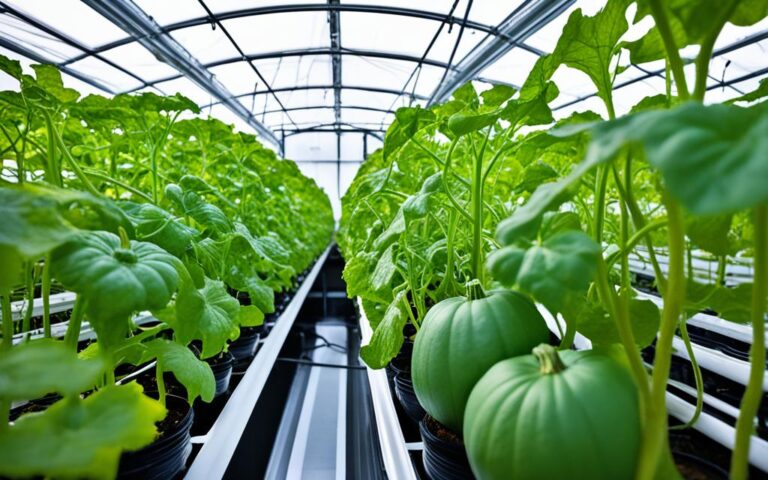Grow Fresh Hydroponic Arugula at Home Easily
Did you know hydroponic arugula grows up to 30% faster than traditional methods? This new way of growing leafy greens has many benefits. It lets you produce food all year, gives you more crops, and uses less water.
If you love gardening, care about health, or just want fresh food, this guide is for you. We’ll show you how to grow hydroponic arugula at home easily.
Key Takeaways
- Hydroponic arugula can be grown up to 30% faster than traditional soil-based methods.
- Hydroponic cultivation offers year-round production, higher yields, and reduced water and land usage.
- Selecting the right hydroponic system and understanding essential nutrient requirements are key to successful arugula cultivation.
- Proper lighting, temperature, and environmental control are crucial for optimal arugula growth.
- Harvesting and storing hydroponic arugula correctly ensures maximum freshness and flavor.
Introduction to Hydroponic Arugula
Arugula, also known as salad rocket or Eruca, is a tasty leafy green that’s become more popular. It belongs to the Brassicaceae family, which includes broccoli and kale. This plant is loved for its unique peppery taste. Growing arugula hydroponically has many benefits, making it great for home gardens and commercial farms.
What is Arugula?
Arugula, or Eruca sativa, is an annual plant that thrives in cool weather. It produces leaves that can be green or have a purple tint. The taste can be mild or very peppery, depending on how mature the leaves are and the growing conditions.
People often use arugula in salads, sandwiches, and as a garnish. It adds a zesty flavor to dishes.
Benefits of Growing Hydroponic Arugula
Hydroponic systems have many advantages over traditional soil farming for growing arugula:
- Year-round production: You can harvest fresh arugula all year, not just during certain seasons.
- Higher yields: Hydroponic arugula can produce up to 30% more than soil-grown plants, thanks to better nutrients and conditions.
- Water efficiency: Hydroponics use up to 90% less water than traditional farming, making it more sustainable.
- Reduced land use: You can grow arugula in compact, stacked systems, saving land.
- Precise control: You can control nutrients, pH, and temperature in hydroponics, ensuring consistent quality and taste.
These advantages make hydroponic arugula a top choice for gardeners and producers. They value its convenience, sustainability, and quality.
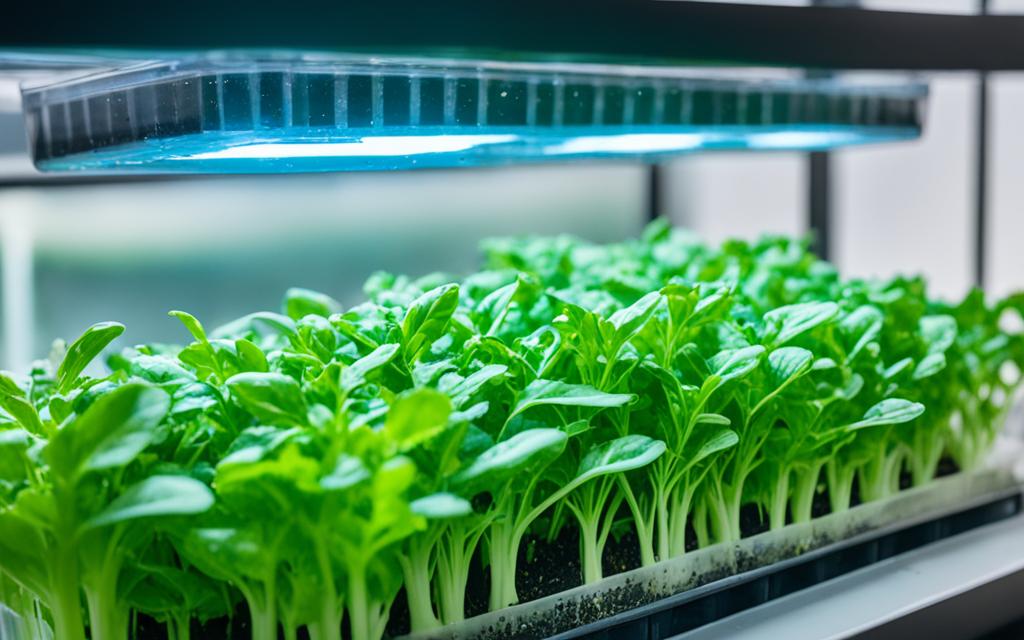
Selecting the Right Hydroponic System
Choosing the right hydroponic system is key to growing hydroponic arugula. There are many types of systems, each with its own benefits for growing this tasty leafy green.
Different Types of Hydroponic Systems
Here are some common hydroponic systems for growing arugula:
- Deep Water Culture (DWC): The plant roots are in a nutrient-rich water solution. This gives them a steady supply of nutrients and oxygen.
- Nutrient Film Technique (NFT): This system uses a shallow flow of nutrient water over the roots. It helps plants take up nutrients well.
- Ebb and Flow: This method floods the growing tray with nutrient solution and then drains it. It makes sure the roots get enough air.
- Aeroponic: The plant roots hang in the air and get misted with nutrients. This gives great oxygen and nutrient delivery.
Factors to Consider When Choosing a System
Think about these things when picking a hydroponic system for arugula:
- Available Space: Figure out how much space you have for your setup. Some systems take up more room than others.
- Budget: Look at your budget and pick a system that fits within it. Consider the cost upfront and over time.
- Maintenance Requirements: Some systems need more upkeep than others. Think about how much time you can spend on maintenance.
- Arugula’s Specific Needs: Know what arugula needs to grow well, like oxygenated roots and steady nutrients. Make sure the system can provide these conditions.
By thinking about these factors, you can pick the best hydroponic system for your space, budget, and arugula’s needs.
Setting Up Your Hydroponic Arugula Garden
Starting a hydroponic arugula garden needs careful planning and prep. Whether you’re diving into indoor farming or vertical farming, follow key steps for success. These steps help your arugula plants grow well.
First, pick the best hydroponic system for you. Think about space, budget, and how automated you want it to be. You can choose from deep water culture, nutrient film technique, or ebb and flow systems. Each has its own benefits.
Then, figure out the best grow space and gather all needed equipment and supplies. This might mean building or putting together the hydroponic setup, setting up grow lights, and mixing the nutrient solution. Always follow the maker’s guide and set up the right conditions like temperature, humidity, and air flow for a great hydroponic arugula garden.
After setting everything up, watch and take care of your system. Make sure your arugula gets the right nutrients, light, and conditions to grow. You might need to change the nutrient solution, pH levels, and other factors to keep your indoor farming or vertical farming going well.
With careful planning and action, you can make a productive and green hydroponic arugula garden. This garden will give you fresh, tasty greens right at home or in the city.
Arugula Seed Selection and Germination
Choosing the right arugula variety is key for growing arugula in hydroponics. There are many options available, each with its own traits. These traits can match your needs and growing conditions. Some top choices include Astro II, Apollo, Olive Leaf, Italian Rocket, Red Dragon, and Sylvetta.
Popular Arugula Varieties for Hydroponics
- Astro II: A fast-growing variety with deeply lobed, spoon-shaped leaves and a peppery flavor.
- Apollo: Known for its vibrant green, deeply serrated leaves and mild, nutty taste.
- Olive Leaf: Featuring a unique, olive-shaped leaf structure and a slightly bitter, pungent flavor.
- Italian Rocket: Produces large, rounded leaves with a classic arugula taste.
- Red Dragon: Boasts stunning, deeply reddish-purple leaves with a peppery punch.
- Sylvetta: A wild arugula variety with small, deeply lobed leaves and an intense, robust flavor.
Germination Process and Requirements
The germination process for hydroponic arugula takes 4 to 8 days. It depends on the variety and growing conditions. For optimal seed sprouting and growth, the seeds need the right temperature, moisture, and light.
Keeping these factors in balance is key for successful hydroponic arugula germination and early growth.
“Proper seed selection and a well-managed germination process are the foundations for thriving hydroponic arugula crops.”
Nutrient Management for Hydroponic Arugula
Keeping the right amount of nutrients is key for hydroponic arugula to grow well. Arugula needs a mix of essential nutrients to do well in a hydroponic setup.
Essential Nutrients and Their Roles
Hydroponic arugula needs nitrogen (N), phosphorus (P), and potassium (K) for growth. These nutrients help with photosynthesis, root growth, and keeping the plant strong. Calcium (Ca) and magnesium (Mg) are crucial for cell walls and making chlorophyll. Iron (Fe), manganese (Mn), and zinc (Zn) help with various plant functions.
Preparing and Monitoring Nutrient Solutions
For the best hydroponic nutrient management, prepare and check the nutrient solution carefully. Mix the right hydroponic arugula nutrients and keep the pH and electrical conductivity (EC) levels right. Testing and adjusting the arugula nutrient requirements often is key to avoid problems that can hurt plant growth and yield.
“Proper nutrient management is the foundation for growing healthy, vibrant hydroponic arugula.”
Lighting Requirements for Hydroponic Arugula
Proper lighting is key for growing hydroponic arugula indoors. Arugula needs a specific light spectrum and intensity to do well. It does best with blue-dominant light when it’s germinating and in the early stages. Later on, it needs a full-spectrum light.
Types of Grow Lights for Indoor Cultivation
Growers have several options for lighting indoor hydroponic arugula. These include:
- LED (light-emitting diode) grow lights
- Fluorescent grow lights
- High-intensity discharge (HID) lamps
Each grow light type has its pros and cons. LED lights are energy-saving, don’t get hot, and can be set to match arugula’s light needs. Fluorescent lights are more affordable. HID lamps are great for big indoor gardens because they give off a lot of light.
It’s important to watch the light’s intensity and how long it’s on. This helps hydroponic arugula grow and develop well.
| Grow Light Type | Advantages | Considerations |
|---|---|---|
| LED | Energy-efficient, low heat, customizable spectrum | Higher initial cost |
| Fluorescent | Budget-friendly, good for small spaces | Lower intensity, shorter lifespan |
| HID | High-intensity illumination, suitable for large spaces | Generate more heat, higher energy consumption |
“Proper lighting is the foundation for healthy and productive hydroponic arugula cultivation.”
Temperature and Environmental Control
Keeping the right temperature is key for hydroponic arugula to grow well. Arugula does best in a temperature of 45°F to 65°F (7°C to 18°C). The perfect temperature ensures healthy growth, stops it from flowering too early, and keeps the leaves tasting great. In indoor setups, climate control systems like heaters or coolers help keep the right temperature for growing arugula.
Ideal Temperature Range for Arugula Growth
Arugula loves cool weather and grows best in a mild climate. For the best growth, it needs:
- Daytime temperatures between 45°F to 65°F (7°C to 18°C)
- Nighttime temperatures between 40°F to 55°F (4°C to 13°C)
- Relative humidity levels around 60-70%
Keeping these conditions in an indoor farm is key for growing tasty, high-quality arugula leaves.
| Temperature Range | Impact on Arugula Growth |
|---|---|
| 45°F to 65°F (7°C to 18°C) | Optimal for healthy growth and development |
| Below 40°F (4°C) | Can slow growth and increase risk of cold damage |
| Above 70°F (21°C) | May lead to premature bolting and bitterness in leaves |
By keeping the ideal temperature range for hydroponic arugula, growers can have a steady supply of fresh, tasty leaves all year. This is true even in controlled environments.
Maintaining Optimal pH and EC Levels
Getting the right balance of pH and electrical conductivity (EC) is key for your hydroponic arugula to grow well. The ideal pH for arugula is between 6.0 and 7.0. This range makes sure the plants can get the nutrients they need.
It’s also important to keep an eye on the EC. This measures the total solids in the nutrient solution. Adjusting the EC helps give your arugula the right nutrients for growth.
The Importance of pH and EC in Hydroponics
In hydroponics, pH and EC levels are very important for your arugula’s health and growth. The pH affects how well plants absorb nutrients like nitrogen, phosphorus, and potassium. Keeping the pH right helps plants take in these nutrients better, leading to strong growth and tasty leaves.
The EC measures the dissolved minerals and salts in the solution. Keeping it at the right levels makes sure your arugula gets the right amount of nutrients. This supports their growth and health.
It’s important to check and adjust the hydroponic arugula pH and hydroponics water quality often. By doing this, you can give your plants the best conditions for a great harvest.
Hydroponic Arugula Growth Stages
Growing hydroponic arugula is rewarding. Knowing its growth stages is key for the best results. We’ll look at the main phases, from seedling to harvest.
Seedling Stage
The seedling stage is crucial for young arugula plants. They germinate and grow their first true leaves here. It’s important to keep the soil moist, provide the right light, and use a balanced nutrient solution. This ensures a strong start for the plants.
Vegetative Stage
When arugula plants enter the vegetative stage, they grow bigger leaves. Adjust the light and nutrients to help them grow and produce more leaves. Keeping an eye on the plants and adjusting as needed is important for success.
Maturity and Harvesting
Arugula plants are ready to harvest when they reach maturity. This usually takes 30 to 40 days after germination, depending on the type and growing conditions. Watching the plants closely will tell you when it’s time to pick them, ensuring you get the freshest taste.
Understanding hydroponic arugula’s growth stages helps you manage your garden better. With the right care, you can enjoy a steady supply of this tasty and healthy leafy green.
Common Pests and Diseases in Hydroponic Arugula
Growing hydroponic arugula at home has many benefits. But, you should know about pests and diseases that might hit your crop. By tackling these issues early, you can keep your hydroponic arugula garden healthy and thriving.
Identifying and Treating Hydroponic Arugula Pests
Some pests can bother hydroponic arugula, such as:
- Flea beetles: These small, jumping beetles can chew holes in the leaves, compromising the plant’s health and appearance.
- Slugs: Slugs can feast on the tender arugula leaves, leaving behind telltale slime trails and damage.
- Cabbage loopers: The larvae of this pest can defoliate arugula plants, leading to reduced yields.
To fight these pests, try organic methods like introducing beneficial insects or using neem oil. Keep an eye on your plants and act fast to keep them healthy.
Preventing and Managing Hydroponic Arugula Diseases
Hydroponic arugula can get diseases like downy mildew. This can turn leaves yellow and decay, hurting the plant’s health and yield. Here’s how to stop and deal with diseases:
- Maintain optimal growing conditions, including proper temperature, humidity, and air circulation.
- Regularly clean and disinfect your hydroponic system to eliminate potential disease vectors.
- Use disease-resistant arugula varieties whenever possible.
- Implement a proactive disease management plan, such as the application of organic fungicides, if necessary.
By being alert and acting early, you can have a successful and healthy hydroponic arugula harvest.
Harvesting and Storing Hydroponic Arugula
Growing arugula hydroponically lets you harvest it quickly and efficiently. You can start picking arugula in 30 to 45 days after planting seeds. For a faster harvest, microgreens are ready in just 14 days.
When and How to Harvest Arugula
The best time to pick hydroponic arugula is in the morning. The leaves are full of moisture and turgid. Use sharp scissors to cut the leaves an inch above the soil, focusing on the outer and lower ones.
This method lets the plant keep growing. You get more harvests from one planting.
Proper Storage Techniques
After harvesting, store your arugula right to keep it fresh and tasty. Put the leaves in a bag with holes or a container that won’t let air in. Keep it in the fridge to make it last longer.
| Harvesting Hydroponic Arugula | Storing Hydroponic Arugula |
|---|---|
|
|
Follow these easy steps for harvesting and storing arugula. You’ll have a steady supply of fresh hydroponic arugula for your recipes. This way, you can get the most out of your arugula crop.
Conclusion
Growing hydroponic arugula at home is rewarding and easy. You just need to know the basics of hydroponic arugula growing. This includes picking the best hydroponic gardening system, managing nutrients, and storing your harvest right.
It doesn’t matter if you’re new to indoor farming or a pro. Adding hydroponic arugula to your urban agriculture can be a great choice. It gives you a steady supply of fresh greens for cooking. Plus, you get to enjoy the taste and health benefits of this tasty herb at home.
This guide has given you the tools to start your hydroponic arugula growing adventure. Now, you can explore a world of flavors and nutrition with your own homegrown produce.
